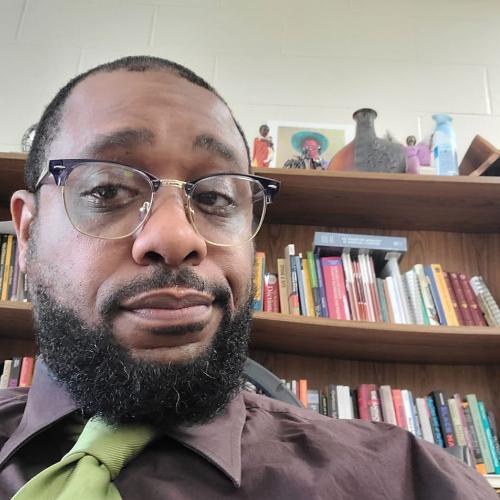English
Ph.D
Penn State University
Spring 2011

David F. Green Jr. is an Associate Professor in the department of Literature and Writing and the Associate Chair of Writing at Howard University. He remains committed to serving historically underrepresented students and theorizing rhetoric and composition practice at minority serving institutions. He earned his PhD in English from Pennsylvania State University with an emphasis in African American Rhetoric and Writing. Dr. Green’s teaching and research focuses on theories of writing and linguistic justice, as well as the verbal traditions of African Americans expressed through literature, Hip Hop and Black popular culture. He has published a textbook on Black Writing Studies(BWS), Visions and Cyphers: Explorations of Literacy Discourse and Black Writing Experiences (2016), and he has published essays that appear in journals and collections such as Changing English, College Language Association Journal, College English and The Lauryn Hill Reader. He is a past secretary of the Conference on College Compositions and Communication and a past member of the Modern Language Association and Conference on College Compositions and Communication joint task force on AI Writing. He is currently the Vice President of the Council of Writing Program Administrators (CWPA) and continues to serve on special tasks forces for the study of AI and Writing within the MLA and CCCC organizations. He continues to facilitate workshops, serve as a speaker, and an advocate on issues related to writing, equity, culture, and social justice.
Ph.D
Penn State University
Spring 2011
BA
Hampton University
2004
As a scholar I am deeply invested in culture, language, and the performance of self in writing. I see those areas, as well as related interests in race, teaching, and literacy as central to the types of research I do and questions I engage. More specifically, these interests allow me to explore some of the social and educational inequalities that I witnessed or experienced growing up in Newark NJ and teaching in Newark and Norfolk, VA public school systems. I was raised by two teachers and I am very sensitive to the way education provides or denies access to important social and personal needs. Pedagogy---the leading of minds whether public, alternative, or academic to a critical understanding of their surroundings---is a core element of modern communication practices and of various modes of identification or persuasion. For me, pedagogy is inherently rhetorical often influencing my intellectual journey and personal interests in ways that shape my scholarly identity. In addition to pedagogy, African American expressive culture represents another area of serious interest. In particular, legacies of bondage and asymmetrical social relations provide customs, rituals, and belief systems that guide my reading of social phenomena and the way I navigate the public sphere. It is this base that guides and most directly shapes my identity as a scholar, colleague, and citizen. This research derives from a distinctive understanding of African American Rhetoric. Rhetoric, within the popular imagination maintains a troublesome position as the use of language to deflect or deceive, but as an intellectual practice rhetoric frames the study of the way people use symbols, language, and images to shape or inform thinking on a particular topic. African American rhetoric examines the artistic and political forms of communication that African descendants within the New World developed to both form and critique community. My interests lay mainly within the way African American people use language strategically to convey complex ideas about a people and their struggle. For that reason, I examine music, oratory, politics, literature, and social practices to gain a deeper understanding of the way a people express and define themselves. Under this umbrella I take a deep interest in the artistic forms, social practices, and intellectual homages that exist within Hip Hop. I view Hip Hop as a contemporary expression of African American literature and a powerful practice for examining contemporary Black culture.